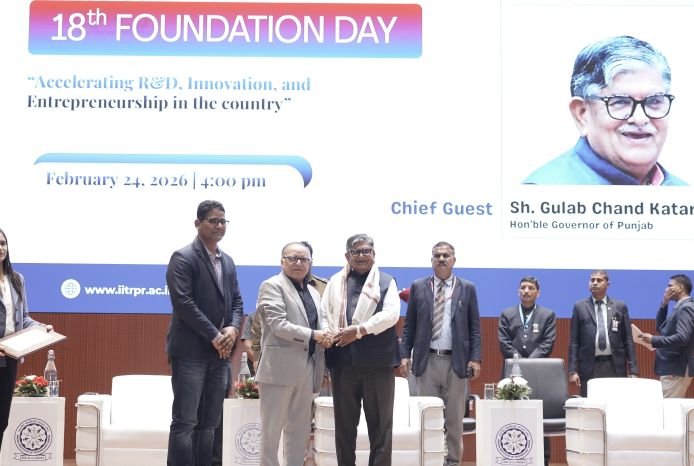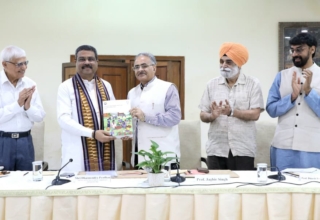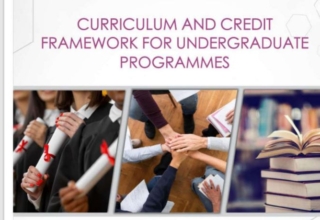
NCPCR’s POSCO-EBox, an online complaint system for confidential registration of complaints regarding sexual offence against children finds mention even as WCD minister Maneka Gandhi suggests sensitization of young students about good and bad touch; inclusion of Dr. Ambedkar‟s Panch Teerth in curriculum suggested by Social Justice & empowerment minister Gehlot
Youth affairs and Sports minister emphasizes importance of community service and volunteer efforts in students

The Union Minister for Social Justice and Empowerment, Shri Thaawar Chand Gehlot, the Union Minister for Women and Child Development, Smt. Maneka Sanjay Gandhi, the Union Minister for Minority Affairs, Shri Mukhtar Abbas Naqvi, the Minister of State for Youth Affairs and Sports (I/C) and Information & Broadcasting, Col. Rajyavardhan Singh Rathore, the Minister of State for Human Resource Development and Water Resources, River Development and Ganga Rejuvenation, Dr. Satya Pal Singh and other dignitaries are also seen.
The 65th Meeting of the Central Advisory Board of Education (CABE) held in New Delhi on January 15-16 adopted four resolutions after union HRD minister Prakash Javadekar reiterated that education is a national agenda which empowers the individual, family, society and the nation. He endorsed that the States requirements of additional funds is well justified. Besides union ministers Maneka Gandhi (Women & Child Development), Mukhtar Abbas Naqvi (Minority Affairs), Col. Rajyavardhan Singh Rathore (Youth affairs & Sports) and Thawar Chand Gehlot (Social Justice & Empowerment), education Ministers of 20 States, representatives of 28 States and Union Territories, Members of CABE, heads of autonomous organisations, Vice Chancellors of Universities, and Secretary, Department of Higher Education and Member Secretary, CABE and Secretary, Department of School Education & Literacy were present in the meeting along with senior officials of the Central and State Governments.
In the meeting, the following resolutions were adopted:-
It would be our endeavour to launch „Operation Digital Board‟ in all schools in five years. This will be undertaken jointly by Centre, State, CSR, and community. This will improve the quality of education. Students will be empowered with 360 degree information with interesting learning experience and teacher accountability will also increase.
We are committed to ensure Quality, Equity, Accessibility, Accountability and Affordability in education by pro-active action and plan.
iWe are commited to promote Swacch Bharat, Ek Bharat Shrestha Bharat, Padhe Bharat, Sugamya Bharat and physical education.
We resolve to promote human value education, life skill education, experiential learning to bring out good human beings out of the education system.
WCD minister Maneka Gandhi suggested introduction of career counselling from 9th class, synergise with WCD Ministry for effective implementation of Pre-School Education with anganwadis. She suggested employing women drivers and helpers in School bus, sensitize young students about good & bad touch by showing Komal film in all schools. NCPCR launched POSCO-EBox, an online complaint system for confidential registration of complaints regarding sexual offence against children. States should encourage their students for applying for MWCD scholarships. To promote greater tolerance among students belonging to different religions, she suggested like earlier Moral Science classes, religious books of all religions may be exposed so that students can start appreciating other religions.
Social Justice & Empowerment minister Thawar Chand urged for a check on privatization of education, and also to provide a socially equitable education and inclusion of Dr. Ambedkar‟s Panch Teerth in curriculum.
YAS minister Col. Rajyavardhan Singh Rathore desired that fitness and sports should be included in school curriculum. He also suggested optimal use of playgrounds after schools hours as well as the need to emphasise importance of community service and volunteer efforts in students.
It was generally recognised that States have been doing excellent work at the ground levels for promoting inclusive education and digital initiatives which were appreciated. In 3 particular, some steps such as opening residential schools , setting up girls colleges, smart classrooms, strengthening Mid Day Meal scheme, teacher training, use of CSR funds, aptitude tests along with Class X results, adolescent health programme training for teachers to prevent sexual offences on children and ensure safety, soft skills training for students, teacher training portal ‘Guru Chetna’. The participants deliberated on several aspects of different level of education and how efforts can be made to improve educational levels of the students.
Karnataka Higher Education Minister Basavaraja Rayareddi asked for enhancing the existing budgetary allocation to higher education and urged the Centre to allow the universities to raise funds through alternative modes and explore the option of setting up the equivalent of not-for-profit companies in higher education to evolve new models of financial autonomy. It also pitched for a “skill university” and “entrepreneurial university” in every state. The government should ensure “increasing the financial independence of the universities by the development of ahighly differentiated system of the rate of recovery through tuition fees, which does not burden the poorer sections of the society”, Rayareddi said.
He also suggested to the government to explore the possibility of establishing the equivalent of not-for-profit companies in higher education to evolve new models of financial autonomy and innovative fundraising techniques through a greater integration of the community-oriented services and social entrepreneurship.
Stating that there should be no discrimination between the central and state-funded universities, Rayareddi said, “All benefits extended to the central universities must also be extended by the state governments to the state universities and the Centre must incentivise the states to do so.”








